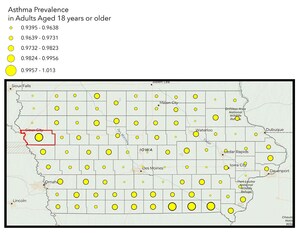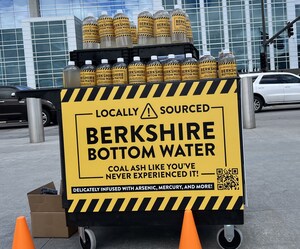Iowa Utilities Board's study to examine power company regulations for cost-effectiveness, reliability
Offers opportunity for greater public transparency
DES MOINES, Iowa, Aug. 30, 2023 /PRNewswire/ -- This week, the Iowa Utilities Board (IUB) kicked off the first of three public input and discussion sessions ("charettes") to review state laws related to how utilities set their rates. These sessions will wrap up in early November and result in a set of legislative recommendations to be considered in the 2024 legislative session. This process stemmed from the passage this year of House File 617, which required the IUB to undertake this review with a focus on "ensuring safe, adequate, reliable, and affordable utility services provided at rates that are nondiscriminatory, just, reasonable, and based on the utility's cost of providing service to its customers within Iowa." The IUB has hired consulting firm London Economics to convene stakeholders and perform the required analysis in Docket No. NOI-2023-0001.
This is a critical moment for Iowa as the state has not reformed its regulations governing the energy sector since 2001. The 2001 law delivered a sea change in how the state regulated utilities and enabled the rapid expansion of wind energy in Iowa. However, massive transformations in energy markets and technologies have revealed shortcomings in Iowa's approach and led to questions about whether it is time to update Iowa's framework for regulating utilities.
"It's been more than two decades, and now is the time to adopt a future-focused approach to regulating utilities that can deliver clean energy at the lowest cost to ratepayers," says Kerri Johannsen, Energy Program Director with the Iowa Environmental Council.
In Iowa, electric utilities are monopolies – the State of Iowa allows them to be the only provider in an area in exchange for careful regulation to make sure their operations are efficient and rates are fair. This requires transparent and thorough oversight to balance the financial interest of the company and the customers.
"When it comes to monopoly utilities that serve Iowans, a robust and transparent planning process provides accountability and helps ensure the clean, low-cost options are not ignored in favor of expensive legacy fossil fuel generation," said Josh Mandelbaum, Senior Attorney with the Environmental Law and Policy Center. "Despite evidence of cost-effective and reliable alternatives, MidAmerican and Alliant have chosen to run costly, old coal plants at customer expense, prioritizing their own profits over the customers who have no choice in electricity provider."
Recent studies indicate that as of this year, 99% of all coal plants in the U.S. were more expensive just to operate compared to building new wind and solar. This is especially true for Iowa, where all coal used in power plants must be imported, costing ratepayers for both the cost of coal and its transport. At the same time, Iowa is one of the top five states in the U.S. for wind and solar generation potential due to the abundance of wind and sunshine. Battery storage technology is now widely available and can cost effectively balance wind and solar generation.
Additionally, the cost of wind energy dropped by 63% between 2009 and 2023 and utility-scale solar by 83%. Battery storage prices have dropped over 70% since 2015. For both the sustainability of the environment and the security of ratepayers' bank accounts, the transition to renewables is inevitable and necessary.
"Around the country, utility regulators are increasingly planning for a transition to a clean grid, recognizing that doing so can deliver reliable and affordable electricity, save customers money, and increase grid resiliency in a world of more extreme weather conditions," remarked Laurie Williams, Senior Attorney with Sierra Club. "If Iowa is to remain competitive with other states and continue to attract the big companies that demand clean energy, Iowa needs to be conducting the kind of best-in-class planning that is occurring in other states today."
In addition to the transparency in planning, advocates want to see a revival of energy efficiency programs that once positioned Iowa in the top 20 states for efficiency. These programs were gutted in 2018 when the state's monopoly utilities successfully lobbied for legislation that changed the programs, dropping Iowa to 35th in the nation in 2022. Energy efficiency is the most effective way to reduce energy consumption while maintaining amenities that ratepayers are accustomed to.
According to Johannsen with the Iowa Environmental Council, "There could not be a more important moment for Iowa advocates, utilities, and policymakers to be having this discussion. For us, it represents a moment of hope to restore balance between the utilities and Iowans. This means pushing for comprehensive planning and reinvesting in energy efficiency. These changes can bring down costs for Iowa customers while speeding our transition to clean energy."
The Iowa Environmental Council (IEC) is the state's largest and most comprehensive environmental alliance, comprised of diverse organizations and individuals working together to protect Iowa's natural environment. Through education, advocacy and coalition building, the Council raises awareness, generates action, and creates large-scale change. We work on federal, state, and local public policy issues to ensure a just, healthy environment and sustainable future for all Iowans. Learn more at iaenvironment.org.
The Environmental Law & Policy Center (ELPC) is the Midwest's leading public interest environmental legal advocacy organization. We develop strategic campaigns to protect natural resources and improve environmental quality. Our multi-disciplinary staff employs teamwork approaches using legal, economic, and public policy tools to produce successes that improve our environment and economy. Learn more at www.elpc.org.
The Sierra Club is America's largest and most influential grassroots environmental organization, with more than 3.5 million members and supporters. In addition to protecting every person's right to get outdoors and access the healing power of nature, the Sierra Club works to promote clean energy, safeguard the health of our communities, protect wildlife, and preserve our remaining wild places through grassroots activism, public education, lobbying, and legal action. For more information visit www.sierraclub.org.
SOURCE Iowa Environmental Council

WANT YOUR COMPANY'S NEWS FEATURED ON PRNEWSWIRE.COM?
Newsrooms &
Influencers
Digital Media
Outlets
Journalists
Opted In






Share this article